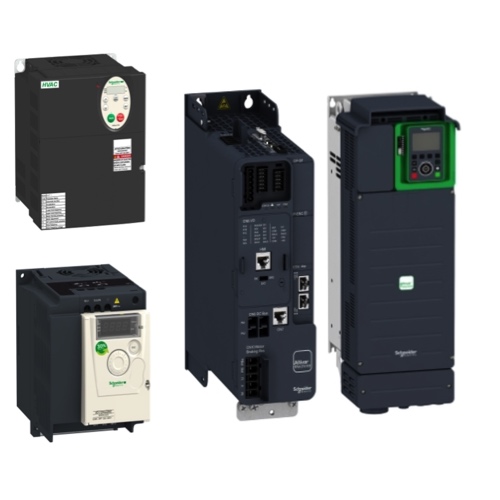Schneider Electric VFDs

RSP Supply offers a complete selection of Schneider Electric Variable Frequency Drives (VFDs), including single-phase and three-phase models ranging from 0.3 HP to 700 HP. The Altivar™ series from Schneider Electric provides precise, efficient motor control across industrial, commercial, and automation applications.
Schneider VFDs do more than switch motors on and off - they enable precise speed and torque control, improving energy efficiency and system performance. Schneider Altivar drives also include advanced motor protection features such as overload, phase-loss, short-circuit, and thermal protection, extending equipment life and preventing costly downtime.
Engineered for seamless integration, Schneider Electric Altivar VFDs support Modbus, Ethernet, and other common communication protocols, allowing for efficient, connected, and intelligent system control. Whether you need compact drives for OEM machinery or high-power drives for large industrial motors, RSP Supply has the Schneider Electric solution to meet your performance and reliability requirements.
FAQ's
1. What is a Schneider Electric VFD used for?
A Variable Frequency Drive (VFD) controls the speed and torque of electric motors, reducing energy use while improving operational precision and efficiency.
2. What makes Schneider Electric’s Altivar drives stand out?
Altivar drives feature advanced motor protection, energy savings, and multi-protocol communication—making them ideal for industrial and commercial systems.
3. Can Schneider VFDs be used in both single-phase and three-phase systems?
Yes. RSP Supply offers Schneider Electric VFDs for both single-phase and three-phase motors, covering power ranges from 0.3 HP to 700 HP.
4. How do Schneider Electric VFDs protect connected motors?
They include overload, phase-loss, short-circuit, and thermal protection features that prevent damage and extend motor life.
5. Are Schneider Electric VFDs compatible with automation systems?
Yes. Schneider’s Altivar drives communicate via Modbus, Ethernet, and other industrial protocols, ensuring seamless system integration.
Motor Starters, Soft Starters and VFDs
Motor Starters
Motor starters safely start and stop a motor in industrial applications. They are designed with a contactor, overload and circuit protection. They are used when basic motor control is required, where torque on the motor is not a concern and speed control is not needed. The advantages of motor starters include: lower cost, allows for remote operation, allows for monitoring of motor state (with the use of auxiliary contacts) and they are safe and efficient. The disadvantages include: high inrush current that can cause fuses to blow and breakers to trip if the inrush is too high, and the starter will allow a full torque to start the motor which can cause the motor to ramp up to full speed very quickly potentially causing the motor to wear and degrade prematurely.
Soft Starters
Soft starters protect motors from inrush current by gently ramping up the motor to full speed. They provide all of the same functions as a traditional motor starter. The advantages of soft starters include: they are less expensive than a VFD when only startup control is needed, they are a smaller system than a VFD where space is a concern and they prevent unwanted torque upon startup, prolonging the life of the motor. The disadvantages include: they are more expensive than a traditional motor starter and they do not allow for full speed control.
VFDs
A Variable Frequency Drive (VFD) allows for the slow ramp up of a motor during startup and the slowing down of the motor during shutdown. It also allows for full speed control during the entire run cycle of the motor. VFDs provide the same functions as both the traditional motor starters and soft starters. The advantages of VFDs include: full speed control (start, stop and in-between), more custom control and monitoring, energy savings due to efficient motor usage and less wear and tear on the motors. The disadvantages include: they are more expensive and larger than other motor control options and they generate heat that may require fans or AC units.

